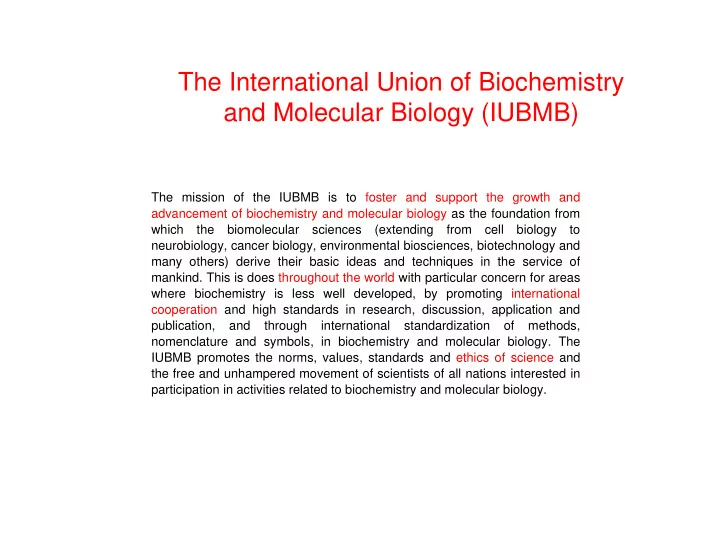

The International Union of Biochemistry and Molecular Biology (IUBMB) The mission of the IUBMB is to foster and support the growth and advancement of biochemistry and molecular biology as the foundation from which the biomolecular sciences (extending from cell biology to neurobiology, cancer biology, environmental biosciences, biotechnology and many others) derive their basic ideas and techniques in the service of mankind. This is does throughout the world with particular concern for areas where biochemistry is less well developed, by promoting international cooperation and high standards in research, discussion, application and publication, and through international standardization of methods, nomenclature and symbols, in biochemistry and molecular biology. The IUBMB promotes the norms, values, standards and ethics of science and the free and unhampered movement of scientists of all nations interested in participation in activities related to biochemistry and molecular biology.
The Activites of the IUBMB • Triennial Congresses with a Young Scientists Program • Conferences and Special Meetings with a Young Scientists Forum • Symposia • Plenary Lectures and Jubilee Lectures • Wood-Whelan Short-term Research Fellowships • Educational Activities • Publication Activities • Metabolic Pathway Maps and Animated Metabolic Maps (Animaps) • Committee on Biochemical Nomenclature • Standards for the PhD Degree in the Molecular Biosciences
The World of the IUBMB 54 IUBMB Adhering Bodies Argentina, Australia, Austria, Azerbaijan, Belgium,Brazil, Bulgaria, Canada, Chile, China, China (Taipei), Croatia, Cyprus, Czech Republic, Denmark, Egypt, Finland, France, Germany, Great Britain, Greece, Hungary, India, Ireland, Israel, Italy, Japan, Korea, Latvia, Mexico, Netherlands, New Zealand, Nigeria, Norway, Pakistan, Philippines, Poland, Portugal, Russia, Slovak Republic, Slovenia, South Africa, Spain, Sweden, Switzerland, Thailand, Turkey, Ukraine, USA, Uzbekistan 28 IUBMB Associate Adhering Bodies Bangladesh, Belarus, Benin, Bolivia, Cameroon, Cuba, Estonia, Hong Kong, Iceland, Indonesia, Iran, Kazakhstan, Kenya, Lithuania, Malaysia, Moldova, Morocco, Nepal, Panama, Romania, Singapore, Togo, Tunisia, Uruguay, Vietnam, Zambia, Zimbabwe 4 IUBMB Regional Associated Organizations FAOBMB - Federation of Asian and Oceanian Biochemists and Molecular Biologists FASBMB - Federation of African Societies of Biochemistry and Molecular Biology FEBS - Federation of European Biochemical Societies PABMB - Pan-American Association for Biochemistry and Molecular Biology 3 IUBMB Associated Organizations IFCC - International Federation of Clinical Chemistry and Laboratory Medicine ISN - International Society for Neurochemistry ISFRR - International Society for Free Radical Research http.//www.iubmb.org
The Governance of the IUBMB The IUBMB Executive Committee 2006 - 2009 President: Angelo Azzi (Switzerland) President Elect: vacant General Secretary: Jacques-Henry Weil (France) Treasurer: Jan Joep H.H.M. de Pont (Netherlands) Publications: Willy Stalmans (Belgium) Symposia: M. Iqbal Parker (South Africa) Congresses and Conferences: Knut-Jan Andersen (Norway) Education: Susan Hamilton (Australia) Affiliated to the Executive Committee: Information Transfer: Peter Ott (Switzerland)
To prevent the life sciences being used for malign purposes particularly in the field of biology and medicine should be used only for mankind’s benefit, but never to do it any harm
To ensure that the benefits of the life sciences are maximised while their risks are minimised – This need for a balance between security and peaceful use
To prevent any further undermining of public confidence in the life sciences or life scientists
To adapt to the changing nature of science Changes in the ways science is pursued have magnified certain possibilities for malign use.
To enhance awareness of issues related to the potential malign use of life science research
Recommend
More recommend